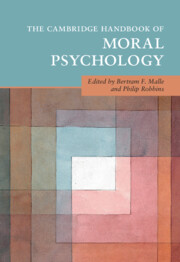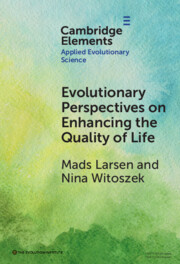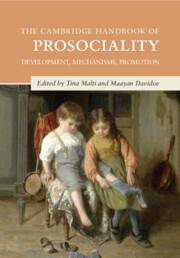29 results
12 - Prosociality
- from Part III - Behavior
-
-
- Book:
- The Cambridge Handbook of Moral Psychology
- Published online:
- 20 February 2025
- Print publication:
- 27 February 2025, pp 273-302
-
- Chapter
- Export citation

The Cambridge Handbook of Moral Psychology
-
- Published online:
- 20 February 2025
- Print publication:
- 27 February 2025
Co-evolution of behaviour and beliefs in social dilemmas: estimating material, social, cognitive and cultural determinants
-
- Journal:
- Evolutionary Human Sciences / Volume 6 / 2024
- Published online by Cambridge University Press:
- 03 December 2024, e50
-
- Article
-
- You have access
- Open access
- HTML
- Export citation

Evolutionary Perspectives on Enhancing Quality of Life
-
- Published online:
- 13 April 2024
- Print publication:
- 23 May 2024
-
- Element
-
- You have access
- Open access
- HTML
- Export citation
Deception aversion, communal norm violation and consumer responses to prosocial initiatives
-
- Journal:
- Behavioural Public Policy , First View
- Published online by Cambridge University Press:
- 01 December 2023, pp. 1-18
-
- Article
-
- You have access
- Open access
- HTML
- Export citation
30 - Toward a New Era of Prosociality Research
- from Part IV - Applications
-
-
- Book:
- The Cambridge Handbook of Prosociality
- Published online:
- 25 May 2023
- Print publication:
- 08 June 2023, pp 600-613
-
- Chapter
- Export citation
28 - Prosocial Behavior, Positive Youth Development, and Character Virtues
- from Part IV - Applications
-
-
- Book:
- The Cambridge Handbook of Prosociality
- Published online:
- 25 May 2023
- Print publication:
- 08 June 2023, pp 560-576
-
- Chapter
- Export citation
1 - Introduction: What Is Prosocial Development?
- from Part I - Development of Prosociality
-
-
- Book:
- The Cambridge Handbook of Prosociality
- Published online:
- 25 May 2023
- Print publication:
- 08 June 2023, pp 3-16
-
- Chapter
-
- You have access
- HTML
- Export citation
17 - Assessing Prosociality
- from Part II - Antecedents and Mechanisms of Prosociality
-
-
- Book:
- The Cambridge Handbook of Prosociality
- Published online:
- 25 May 2023
- Print publication:
- 08 June 2023, pp 335-358
-
- Chapter
- Export citation
27 - Prosociality and Civic Engagement
- from Part IV - Applications
-
-
- Book:
- The Cambridge Handbook of Prosociality
- Published online:
- 25 May 2023
- Print publication:
- 08 June 2023, pp 542-559
-
- Chapter
- Export citation
18 - Parenting and Children’s Prosociality
- from Part III - Development of Prosociality in Context
-
-
- Book:
- The Cambridge Handbook of Prosociality
- Published online:
- 25 May 2023
- Print publication:
- 08 June 2023, pp 361-387
-
- Chapter
- Export citation

The Cambridge Handbook of Prosociality
- Development, Mechanisms, Promotion
-
- Published online:
- 25 May 2023
- Print publication:
- 08 June 2023
Prosociality in the economic Dictator Game is associated with less parochialism and greater willingness to vote for intergroup compromise
-
- Journal:
- Judgment and Decision Making / Volume 15 / Issue 1 / January 2020
- Published online by Cambridge University Press:
- 01 January 2023, pp. 1-6
-
- Article
-
- You have access
- Open access
- HTML
- Export citation
Do the Right Thing: Experimental evidence that preferences for moral behavior, rather than equity or efficiency per se, drive human prosociality
-
- Journal:
- Judgment and Decision Making / Volume 13 / Issue 1 / January 2018
- Published online by Cambridge University Press:
- 01 January 2023, pp. 99-111
-
- Article
-
- You have access
- Open access
- HTML
- Export citation
Cross-national in-group favoritism in prosocial behavior: Evidence from Latin and North America
-
- Journal:
- Judgment and Decision Making / Volume 13 / Issue 1 / January 2018
- Published online by Cambridge University Press:
- 01 January 2023, pp. 42-60
-
- Article
-
- You have access
- Open access
- HTML
- Export citation
Cooperative preferences fluctuate across the menstrual cycle
-
- Journal:
- Judgment and Decision Making / Volume 10 / Issue 5 / September 2015
- Published online by Cambridge University Press:
- 01 January 2023, pp. 400-406
-
- Article
-
- You have access
- Open access
- HTML
- Export citation
Does telling white lies signal pro-social preferences?
-
- Journal:
- Judgment and Decision Making / Volume 10 / Issue 6 / November 2015
- Published online by Cambridge University Press:
- 01 January 2023, pp. 538-548
-
- Article
-
- You have access
- Open access
- HTML
- Export citation
It pays to be nice, but not really nice: Asymmetric reputations from prosociality across 7 countries
-
- Journal:
- Judgment and Decision Making / Volume 10 / Issue 4 / July 2015
- Published online by Cambridge University Press:
- 01 January 2023, pp. 355-364
-
- Article
-
- You have access
- Open access
- HTML
- Export citation
Partner choice does not predict prosociality across countries
-
- Journal:
- Evolutionary Human Sciences / Volume 4 / 2022
- Published online by Cambridge University Press:
- 21 November 2022, e54
-
- Article
-
- You have access
- Open access
- HTML
- Export citation
Prosociality as response to slow- and fast-onset climate hazards
-
- Journal:
- Global Sustainability / Volume 5 / 2022
- Published online by Cambridge University Press:
- 04 April 2022, e10
-
- Article
-
- You have access
- Open access
- HTML
- Export citation

